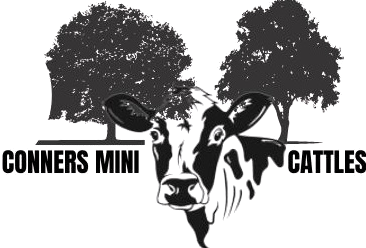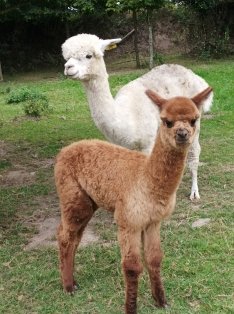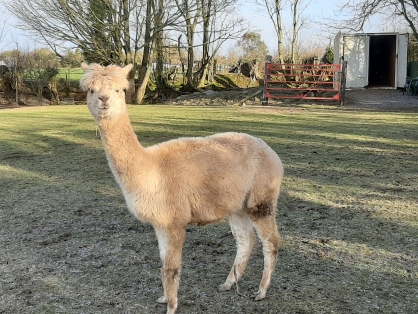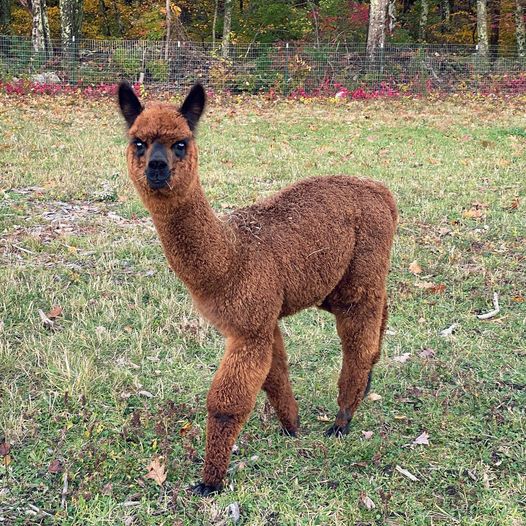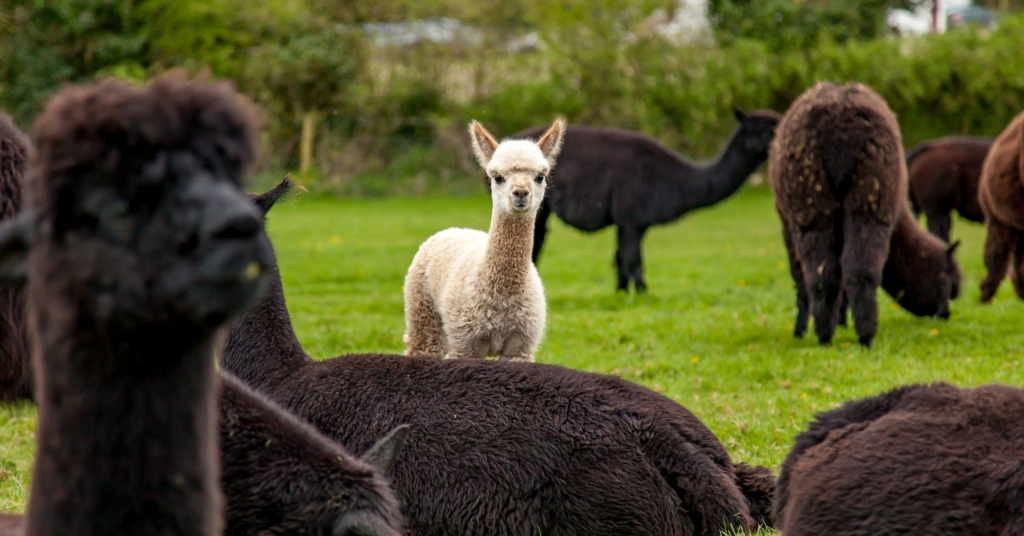Miniature Llamas/Alpacas
We aim to create a center for all things Alpaca. A source for quality Alpaca breeding stock, access to some of the top Alpaca stud males in the country, a learning center for all aspects of Alpaca Husbandry, an outlet for a variety of Alpaca related services and goods. A retail center for all those Alpaca gifts and tokens and, most importantly, a home from home for all Alpaca lovers to relax, stay a while and immerse yourself in the whole Hushabye Farm Alpaca experience.
Alpacas are a domesticated species of South American camelids. They are similar in appearance to llamas, their cousins. Alpacas are descendants of the wild vicuna; llamas are descendants of the guanaco. Both the vicuna and guanaco still roam the Andes mountains of South America. The domestic Llama and the Alpaca were developed through thousands of years of controlled breeding by the Incas. They played an integral part in the Inca civilization which dwelled on the high Andean plateau and the mountains of South America. They used Llamas as pack animals as well as for their meat, hide and sinew; the Alpacas were bred for their fine fiber.
Male Alpacas that aren’t being used for breeding are often sold in pairs or as a trio for a variety of reasons.. They make great pets as they are very docile and all are halter trained in advance of leaving our farm. They are great as therapy animals too, working well at Nursing Homes and schools for children and young people with special needs. Sheep farmers are having great success with Alpacas as flock guards, they being instinctively very protective of new born lambs against fox and grey crow attacks. They are used in country house estates as beautiful backdrops for wedding photos and guest interaction. Also, as lawnmowers, in the garden or in those hard to reach areas like orchards and hilly terrain.
Because our herd is so friendly, well handled and, if I say so myself, stonkingly handsome, our pet males get sold very quickly. Feel free to make contact and, if at all possible, we can reserve some of our boys for you so you won't be disappointed..
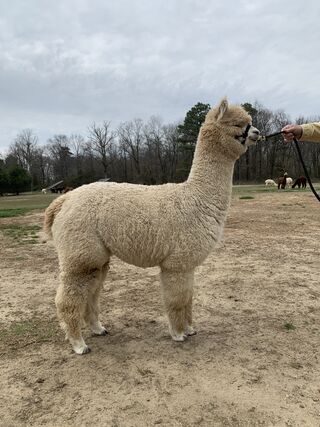
Please contact us if you are interested in purchasing one of our Miniatures or Rare Breeds.
OUR PRICES RANGES FROM $8500 DOWN TO $2500, IT IS NEGOTIABLE.
Available Miniature Llamas/Alpacas for Sale
The first Alpacas were imported into North America in 1984 from Bolivia and Chile. Peru considers Alpacas its national treasure, only allowing export of these animals into the United States since 1993.
Alpaca fleece is still highly valued for its softness and lack of lanolin which makes it hypoallergenic. There are two types of Alpaca and each has its own unique fleece. Huacaya Alpacas have soft, fluffy, crimped fleece that resembles a sheep making it easy to spin. Suri Alpacas have small, pencil like ringlets that produce long, silky fibers. Both types of fiber can be processed much like sheep wool and made into knitted or woven fabrics. Alpaca fiber varies from 18 to 25 microns depending on the individual animal, its age and color. White is the most popular color due to its ability to be dyed into a range of colors, but alpacas come in 22 natural colors with more than 300 different shades. An annual yield of fiber is approximately six pounds from a female and more than ten pounds from a male.
Alpacas can weigh over 150 pounds. Their height limit at maturity is 38 inches at the shoulder. Miniature Alpacas weigh between 100 and 150 pounds. Miniature Alpacas stand less than 32 inches at the shoulder. A male Alpaca is called a “macho”. A female Alpaca is called a “hembra”. It takes a female Alpaca eleven months to have a baby “cried”. Crias are weaned at three to four months. Alpacas live up to 25 years.
Alpacas are still fairly new and uncommon in North America. They are in increasing demand for their luxurious fiber. They are very friendly and gentle enough to be handled by children.
We are very proud of the daily handling and care given to our miniatures here at Connersminicattle’s Farm. We provide proper nutrition and quality veterinary care to all of our animals. Our livestock is current on vaccinations, dental checkups, hoof care, and worming. The health of our animals is very important to us, and we follow rather strict practices. We maintain a closed herd, which means we do not bring in any new animals, embryos or semen. Once an animal is sold, it may not be returned. So that we do not unintentionally introduce disease into our herds, we do not bring our animals to shows, and we do not borrow or lend animals for breeding. We prefer weanlings do not leave Conners Farm before they are 4 months of age. They need time to grow and play with other weanlings, receive discipline from their mothers, and time to change their diet gradually to eliminate the desire for mother’s milk. This also enables Conners Farm time to deworm the weanlings and give them their first vaccinations. All miniatures come with Conners Farm health papers showing up to date vaccinations, deworming schedule, and hoof trimming schedule. They also leave Conners Farm with a brand new halter and leadline. If you need transportation, we can arrange ground transportation within the US and Canada. To other countries, we can arrange air transportation on major airlines.
